I’ve thought long where to begin this letter. For it’s
very difficult to put my thoughts into words here. Still though, I ought to
write this chit to you... coz I think I ought to, coz it’s so very urgent.
To tell you, a couple of months ago I’d visited your
dzongkhag, fondly known as Pemagatshel, “Blissful land of the Lotus”. There
was something about your place that forced me to think hard, something that is
too unsavory, something too cruel. And something that unlikely forced me to write
to you today.
So I bring to you this message from your homeland, i.e.
your dear dzongkhag is sick. In fact, the place of your heart, your home has
been suffering silently, feebly for the past three decades.
A cancer called mining has afflicted her, wounding and bruising
most parts of her body. It’s gobbling her flesh, ruthlessly ripping the body
apart. Her flesh and blood was being sucked out, far away in those jumbo trucks.
Her entire body was undergoing very intense pain, trembling.
When I first saw her, I couldn’t believe it. For, I’d
never laid my eyes at such painful scenes before. Instantaneously, a deep chill
ran down my throat and I almost burst into tears.
Arriving at Pemagatshel, I felt like I’d landed not in
Bhutan, at all. I felt I’d entered somewhere else, where the development policy
was not GNH but greed and materialism - where the government ventures into evil
mining projects even at the cost of ruining environment and its citizens’
health.
The monstrous machines would work at the wounded sites,
producing eerie and frightening sound. Even the ride to Pemagatshel was very unpleasant,
as the road was in a wretched condition, apparently injured by gypsum trucks.
During my stay there, she was trying to convey many
things to me; in fact, she was trying hard to convince me to convey her grief-stricken
message to you.
Hey Pemagatshelpas, how could you despise her when she
was in such a miserable state? How could you settle in other parts of the world
when your dzongkhag is sick and crying out for immediate treatment? How could
you migrate to somewhere with an excuse to escape the hostile and aggressive
environment?
When I heard there are so many of you - highly
qualified, powerful and rich persons in the civil service, corporations, NGOs,
INGOs and private sector - it started to bother me in a strange new way. And I
became angry. This time not angry at the cancer called mining, but at you. Huh!
What’s the use of your education, high positions and
wealth if you don’t bother to help and treat your own rightful birthplace and
fellow-villagers? Can you really serve the Tsa-Wa-Sum when you do not heed to
protecting your birthplace?
I know that you work dutifully for yourself and your
family. But you know what? Our responsibility is more than that, and that’s
called natural responsibility, as has
been always reiterated by our beloved Kings.
Or, are you scared of speaking up against those big mining
companies? Why should you be? Coz Pemagatshel is your birthplace, and you
should love your birthplace unashamedly. Come what may, it’s birthright to
protect it.
Or, are you trying to avoid it? But how could you avoid
the tears of someone, something very close to you? How could you avoid the
place where most of your upbringing was spent? How could you avoid the place
that gave you your sense of belonging and identity?
By avoiding and remaining silent, you’re only supporting
the cruelty and injustice. The truth is that the Blissful Land of the Lotus is suffering not coz of the mining, but
from cruel deafness (from you).
I must explain to you, the mining has brought more harms than
serving it purpose of utilizing the reserve for economic development of your
dzongkhag and optimization of revenue to the government. The mining’s incessant
noise, dust, running trucks and uproarious machines have mired the health and living
condition of innocent local peasants, your own fellow-villagers.
Their only source of livelihood, crops and vegetables, was
affected. Suffocated by the dust and loud noise, everyday they experience
unlikely prickly bitter hot weather. The lush green environment was degrading,
irreparably.
Well, statistics don’t lie! The mining sector’s contribution
to the nation’s economy is at a mere two percent. Pemagatshel received mining
activity since 1983, but quite ironically, your dzongkhag still has second
highest level of poverty. Only a handful of individuals have been benefited.
Your dzongkhag longs for your embrace and hug. She needs
immediate nursing and treatment from you. After all, only you can nurse her,
protect her.
Dear Pemagatshelpas, there’s no task too difficult, no
distance too far. It’s only matter of priority and how much you care for your root.
If you want to be real happy and proud, you have to go back, to be feeling, to
be facing.
You should unite together and raise your voice against
the mining or ask the government to end such cancerous mining operation in your
dzongkhag. Break the silence and make all the appropriate noises - loud and
with conviction. The Blissful Land of the Lotus will still be a better place.
Yours charo
Riku Dhan Subba
P.S. You cannot serve the country if you cannot be loyal
to your root.
 |
| Khotakpa Gypsum Mining; Picture by Tashi Penjor |
 |
| Pemagatshelpas |
 |
| A mining in Pemagatshel |









































